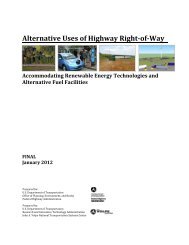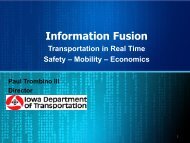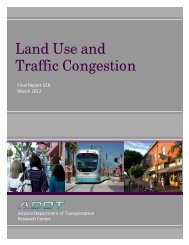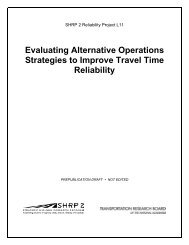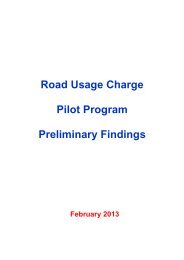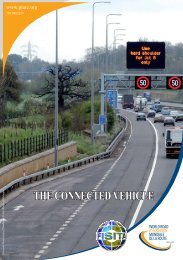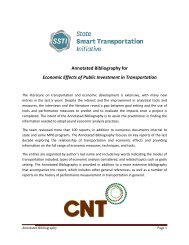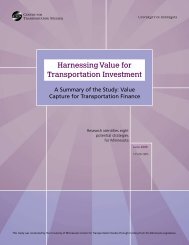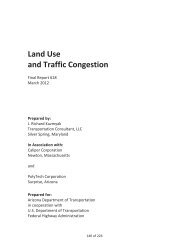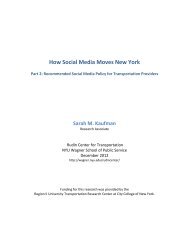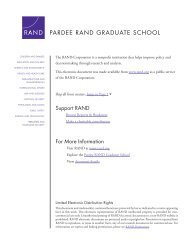Contemporary Approaches to Parking Pricing: - FHWA Operations
Contemporary Approaches to Parking Pricing: - FHWA Operations
Contemporary Approaches to Parking Pricing: - FHWA Operations
You also want an ePaper? Increase the reach of your titles
YUMPU automatically turns print PDFs into web optimized ePapers that Google loves.
As a result, the free parking benefit has made disabled placards a desired commodity, opening the door <strong>to</strong> abuse. In<br />
addition, since the inception of the ADA parking benefit standards, the definition of “disabled” has expanded,<br />
yielding a greater number of drivers who qualify for this benefit. Conversely, the s<strong>to</strong>ck of metered parking spaces,<br />
especially in dense, high-demand areas, has remained relatively constant. Many localities are now experiencing a<br />
disproportionate number of disabled drivers compared <strong>to</strong> the overall number of registered vehicles. The California<br />
Department of Mo<strong>to</strong>r Vehicles reported a 350 percent increase in the number of disabled placards issued in 2010<br />
compared <strong>to</strong> 1990, a rate that is far higher than the population growth rate (Lopez, 2012).The baby boomer generation,<br />
now reaching retirement age, will only add <strong>to</strong> the <strong>to</strong>tal number of disabled drivers.<br />
Beyond the expansion of eligibility, recent studies throughout the country have documented the fraudulent abuse<br />
of disabled parking by people without a disability, who are parking for free and without time limits in the most<br />
convenient and desirable parking places. In 2011 the City of Seattle published a report indicating that 30 <strong>to</strong> 40<br />
percent of metered parking in its down<strong>to</strong>wn core was occupied by vehicles displaying disabled parking placards<br />
(Seattle Department of Transportation, 2012). Viola<strong>to</strong>rs see the value of free parking, especially in high-demand<br />
areas, and therefore use either a family member’s or friend’s placard illegally; additionally, placards of deceased<br />
persons are seldom collected, presenting another opportunity for fraudulent use. This abuse of disabled parking<br />
benefits affects disabled people and their ability <strong>to</strong> access services no differently than the population at large.<br />
<strong>Parking</strong> experts are thinking anew about parking benefits for disabled persons. The goal of accommodation is still<br />
at the forefront, but with the understanding that this should not be allowed <strong>to</strong> interfere with the effectiveness of<br />
parking management strategies. Variable pricing and additional parking strategies will have limited impact if 10 <strong>to</strong><br />
40 percent of high-demand, metered spaces are occupied for an indefinite amount of time, at no cost, by drivers<br />
with disabled placards. Unfortunately, cities frequently lack jurisdiction over disabled parking. Many States, including<br />
California, Illinois, and Texas, offer disabled parking benefits as a statewide policy, leaving local jurisdictions<br />
with a limited ability <strong>to</strong> manage disabled parking.<br />
Arling<strong>to</strong>n County, Virginia, was one of the first communities nationwide <strong>to</strong> address disabled parking placard abuse<br />
and its impact on effective parking management. During the late 1990s, Arling<strong>to</strong>n had a problem of low parking<br />
availability due <strong>to</strong> excessive and fraudulent placard use. The Arling<strong>to</strong>n Disabled Commission approached Arling<strong>to</strong>n<br />
County asking it <strong>to</strong> address these problems and offered support for the elimination of free metered parking al<strong>to</strong>gether.<br />
According <strong>to</strong> an Arling<strong>to</strong>n County parking manager, community support was garnered from inception, and<br />
local officials could therefore engage State officials in an attempt <strong>to</strong> revise State disabled parking ordinances, a necessary<br />
step as Virginia State law limited local jurisdictions’ power in managing disabled parking. Through this process<br />
Arling<strong>to</strong>n, and therefore other Virginia municipalities, gained greater flexibility and enforcement ability with regard<br />
<strong>to</strong> parking management practices. With the necessary structural changes in place, Arling<strong>to</strong>n County rolled out<br />
its “All May Park, All Must Pay” program in 1998, which s<strong>to</strong>pped all-day fraudulent use of disabled placards. Drivers<br />
with a placard were required <strong>to</strong> pay for parking but were allotted twice the time period <strong>to</strong> access services.<br />
The District Department of Transportation (DDOT) in Washing<strong>to</strong>n, DC is building from Arling<strong>to</strong>n’s program and<br />
implemented a disabled parking pilot program in 2012. The goal of the program is <strong>to</strong> create better access for disabled<br />
persons. The District’s old policy allowed disabled drivers <strong>to</strong> park for free at meters District wide (District<br />
Department of Transportation, 2012). Under the pilot program, a <strong>to</strong>tal of 400 meters, the domes of which are<br />
painted red <strong>to</strong> be visibly different from regular meters, provide two spaces per street block for better access for<br />
disabled drivers in commercial zones. Only disabled individuals displaying official placards are allowed <strong>to</strong> park at<br />
these red-domed meters. For the first time disabled drivers in the District will be charged <strong>to</strong> park, but with the new<br />
C o n t e m p o r a r y A p p r o a c h e s t o P a r k i n g P r i c i n g | 25



